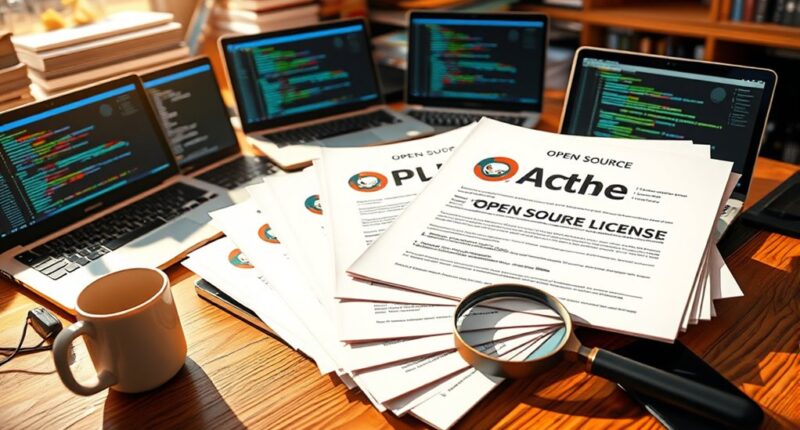Understanding open-source licenses like GPL, MIT, and Apache is crucial because failing to follow their rules can lead to costly legal issues or financial setbacks. For example, ignoring license terms might force you to release source code or face lawsuits, risking your project’s future. Community enforcement and proper compliance help prevent these risks. If you keep exploring, you’ll discover how to protect yourself and stay within legal boundaries while using open-source software.
Key Takeaways
- Violating GPL terms can lead to costly legal disputes and forced release of proprietary code, risking financial ruin.
- MIT and Apache licenses rely on proper attribution; failure to comply can result in legal actions and damages.
- Community enforcement and audits help detect license breaches, which may escalate to lawsuits or financial penalties.
- Non-compliance with open-source licenses can threaten project shutdowns and damage reputation, leading to financial losses.
- Understanding license obligations reduces legal risks, preventing potential lawsuits that could financially bankrupt your business.

Have you ever wondered how open-source software allows anyone to use, modify, and share code freely? It’s thanks to licenses that set the rules for how the software can be used, shared, and improved. But even though open-source licenses promote collaboration, they come with responsibilities you can’t ignore. If you’re not careful about license compliance, you could face legal trouble, or worse, financial penalties that could threaten your project or business. That’s why understanding the different licenses—like GPL, MIT, and Apache—is essential, especially when it comes to community enforcement, which helps keep everyone honest and the ecosystem healthy.
License compliance isn’t just about following rules; it’s about respecting the intentions of the original developers. For example, the GPL (General Public License) is very strict about ensuring that any modifications or derivative works also stay open and free under the same license. If you incorporate GPL-licensed code into your project, you’re required to release your source code and include the same license terms. This means your project must remain open, and you can’t simply close the code later. The community enforces compliance with GPL through peer review, audits, and reports. If someone violates the license, the community can take action—like issuing notices or even legal challenges—to uphold the license’s integrity. This enforcement helps preserve the open-source ecosystem as a shared resource, ensuring everyone benefits from transparency and collaboration.
Community enforcement of GPL ensures open source stays open through peer review, audits, and legal action to uphold developer intentions.
On the other hand, licenses like MIT and Apache are more permissive, offering flexibility while still requiring proper attribution. The MIT license is straightforward: you can do almost anything with the code—use, modify, distribute—as long as you include the original license and copyright notice. Apache is similar but adds provisions related to patents and trademarks, providing additional legal safeguards. Both licenses depend heavily on license compliance, but enforcement is often more informal—relying on attribution and community oversight rather than strict legal mechanisms. Still, if someone breaches these licenses, the original authors can pursue legal action, which underscores the importance of respecting license terms.
Moreover, understanding community enforcement mechanisms is key to ensuring ongoing compliance and fostering trust within open-source projects. When everyone adheres to license requirements, it fosters a healthy, innovative environment. Conversely, neglecting license compliance can lead to lawsuits, financial penalties, or even project shutdowns. So, whether you’re using permissive licenses like MIT or more restrictive ones like GPL, always pay careful attention to license obligations. Doing so not only protects you legally but also supports the open-source community’s shared goal: collaborative, transparent software development that benefits everyone.
Frequently Asked Questions
Can I Combine Code From Different Open-Source Licenses Safely?
You can combine code from different open-source licenses, but you need to ensure license mixing and compatibility. Some licenses, like MIT and Apache, generally work well together, while others, like GPL, have strict requirements. To avoid legal issues, check each license’s terms and ensure they’re compatible. If you’re unsure, consulting legal advice helps you stay compliant and avoid potential problems down the line.
How Do Open-Source Licenses Impact Proprietary Software Development?
Like steering through a minefield, proprietary software development faces license conflicts that can trip you up. Open-source licenses impact your work by requiring compliance and risking license enforcement issues. If you ignore these rules, you could face legal challenges or forced code releases. To keep your project safe, understand each license’s obligations, avoid mixing incompatible licenses, and stay vigilant—think of it as respecting the rules of the game to keep moving forward smoothly.
Are There Legal Risks With Using Open-Source Code in Commercial Products?
You might face legal risks with using open-source code in commercial products, especially if you violate license terms. License violations can lead to liability concerns, such as lawsuits or penalties. To avoid these issues, guarantee you understand each license’s requirements, like providing attribution or sharing modifications. Staying compliant helps protect your business from potential legal troubles and keeps your product legally sound.
What Steps Should I Take to Comply With Open-Source License Terms?
Think of license compliance like following a recipe—miss a step, and the dish might not turn out right. To meet your legal obligations, you should read and understand each license’s terms, track any open-source code used, and include proper attribution. Keep documentation organized, and consider consulting legal experts to guarantee you’re fully compliant. This proactive approach helps you avoid legal trouble and keeps your project running smoothly.
Can Open-Source Licenses Change After Software Release?
You might wonder if open-source licenses can change after you’ve released software. Usually, license modifications aren’t retroactive, but they can affect future versions. If you inherit code with a specific license, you must follow that license’s terms for all derived works. Always check if the license allows changes or updates, as license inheritance means subsequent versions could have different restrictions or permissions, impacting your compliance.
Conclusion
Now that you understand the ins and outs of GPL, MIT, and Apache licenses, you’re better equipped to navigate the open-source world. Remember, choosing the wrong license can be like sailing into a storm without a compass—costly and unpredictable. So, read the fine print carefully, keep your wits about you, and don’t let open-source licenses catch you off guard like a trapdoor in a vintage 1920s speakeasy. Stay savvy, and code on!









